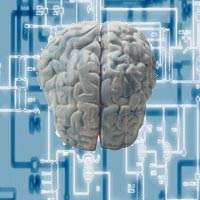rgvandewalker: I'm a christian, and I'm also mildly certified as a philosopher- (I have a B.A. in it).
The fundamental assumption of science is occam's razor, that is, let the available facts determine the best current theory.
Actually, Ocs razor is the scientific principle by which the simplest solution to a problem is assumed correct, unless evidence is produced which supports a more complex solution. Can you produce such evidence, or do you resort to calls for faith? As a materialist I have an aversion to sky hooks...
Science as such doesn't guide one about where to seek relevant facts.
I strongly disagree with you on this point, but let's see where you go with your supporting argument...
By an accidental lack of exposure to the right facts, a scientist using the above methods to build an ethical system (for personal use)can easily make some very wrong life decisions.
The same can be said of theologians and their interpretations of religious texts. When it comes to ontology there is no such thing as 100% certainty. Human error is by no means confined to science. In fact, the scientific method acts as a safe guard against many of the logical fallacies that humans being tend to make.
That is, science is good for finding explanations, but it can easily go very wrong for running an operation that has to fail safe, such as an immortalist life.
A statement of opinion.
Engineers don't do this (I'm also an engineer, B.S. computer science). We use theory as a starting point, but no system goes into service without documented historical experience with it, from testing and industry standards.
great...relevance?
In human ethics, such experiments have to span several human generations to be meaningful. That is, if we care about how our children turn out.
I encourage all you atheists and rational materialists to examine the real historical bases and personal outcomes of religions, which are in large part "industry standards" for ethical systems.
So stick with what works, right? Wrong. There are numerous flaws in the tapesty known as the Judeo-Christian ethic. This is largely the result of this ethical systems memetic evolutionary origins and the blind developmental process which was utilized in creating it. Within modern society in particular, religious tenets have consistently stood in the way of progress. Frankly, they have out grown their usefulness, and your complacency in accepting their legitimacy is disheartening.
It is my contention that a system of ethics based on evolutionary theory and naturalism would be much more effective in creating a greater level of social cohesion and societal progress. Antiquated ethical systems such as Christianity should be relegated to a kind of "memetic preserve", where we can marvel at the beautiful design of the system, all the while understanding it to be a fallacy which has been replaced by a superior way of looking at the world.
"It is time for humanity to grow up." -- Daniel Dennett
Your place value on utility (which I think is misplaced), but what about truth? Is the truth of our reality as important, if not more important, than social cohesion??
My personal experience, backed by a lot of reading of biographies and interviews is that most religions are utter bunkum, and a few of them have very careful, well-documented historical support, backed up by millions of happy human lives lived in a wide range of circumstances, including the most complex civilizations ever.
Actually, I think a great deal of the technological and social progress that has arisen within modern "complex" civilizations is not a result of religion, but science. Second, you make religion sound like McDonald's... 99 billion served. What about all of the horrors perpetrated in the name of religion? Or is this just an inconvenience for you?
That is, be conservative. You'll live longer.
I don't want to live longer, I want to live forever.
I admit that I'm a late adopter. I just bought my first Palm, and I still run Win '98.
How about evolutionary theory? Have you bought it yet, or are you still satisfied with the older version?


















































